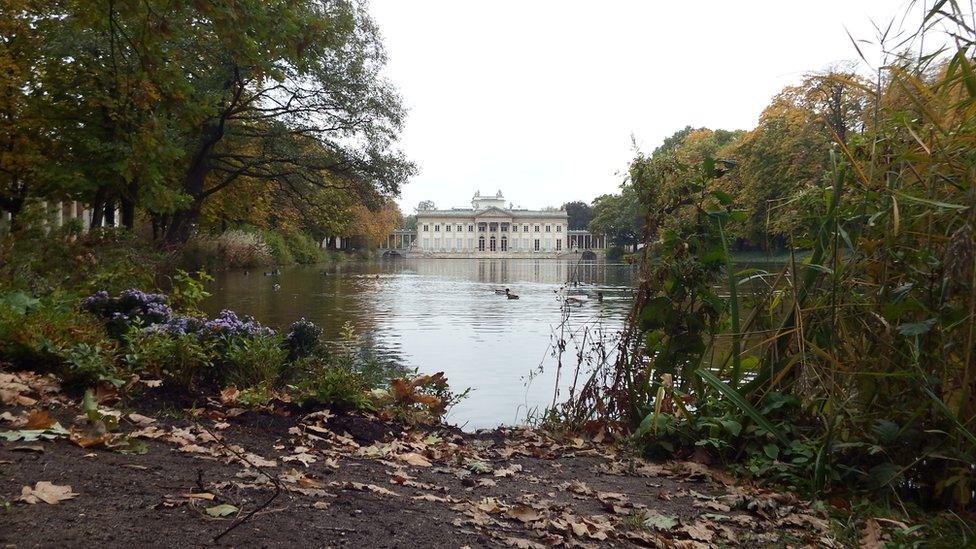EU Brexit: Poland feels the chill ahead of UK talks
- Published

Poland has reaped big financial rewards since it joined the EU in 2004
There is a warning of winter-to-come on the edge of the October winds sweeping through the elegant parks and handsome squares of Warsaw. Pedestrians are already bundled up against the cold.
It will be useful preparation for the chilly atmosphere Poland's politicians seem to expect around the table when next year's Brexit negotiations bring together the UK and the 27 countries that will remain in the EU after it leaves.
Modern Poland is a place of sharply polarised politics in which a broad coalition of liberal opposition parties fear their country is in the grip of a government so deeply conservative that it is exerting a kind of reactionary grip on political life.
"People who support one side really don't speak to people who support the other," one old friend told me in Warsaw. "I don't even remember that in the communist days."
One thing that does more or less seem to unite Poland's fractious political class, though, is a profound belief in the value of the EU.
In the UK, Brussels may be seen as a source of unwanted migration and pettifogging over-regulation, but in a country which has emerged from the suffocating grip of Soviet communism within the last 30 years, EU membership is seen as a guarantee of a democratic future and a seat at the high table of European politics.
Poland, of course, has also enjoyed huge financial benefits from its membership and that has no doubt helped shape that positive perception. But there is a genuine readiness among Polish politicians to accept that it is worth swallowing the minor irritations of membership to preserve the overall benefits.
For that reason politicians here are generally adamant that the UK cannot have a bespoke deal with the EU in which it might negotiate membership of the single market without signing up to the free movement of EU labour.
Mr Trzaskowski expects the remaining 27 members of the EU to take a tough line in Brexit talks
Former Europe Minister Rafal Trzaskowski said he believed the so-called four freedoms of the single market (labour, capital, goods and services) had to be accepted or rejected as a package.
It's not just about negotiating with Britain, he explains, but about making sure that Brexit doesn't trigger a wider unravelling of the Union.
"Trying to unpick the freedoms, and saying 'OK I like financial freedom of movement, but I don't like free movement of workers' - I mean, that would actually allow other states to do exactly the same," he argues.
That kind of argument, which you hear from other politicians in Warsaw too, places Poland in the middle of what is starting to feel like a concerted European push to warn Britain that it won't have access to the single market unless it allows EU migration.
In all the countries that joined the EU after emerging from the shadows of Soviet communism there is a deeper and more complex dimension to the argument about free movement of labour, which is perhaps difficult for British voters and politicians to grasp.
Writer Julia Szyndzielorz says Poles attach huge importance to freedom of movement
Anyone who's over 50 in Poland - and all of their children - will remember the petty humiliations of Soviet occupation and, in particular, the enormous difficulties of arranging foreign travel even with the communist bloc.
For all those people the right to travel to countries like Britain which came with EU accession was a sign that their country and its people were now accepted at the high table of European politics.
"I myself remember, after we joined, and for the first time at an airport, I could join the EU citizens aisle, and just go without much control - without a stamp - and cross the border," said writer and journalist Julia Szyndzielorz.
"I had tears in my eyes, because that was such a touching moment. And to be deprived of that will be very, very hurtful."
So politicians in Poland may well shape their approach to Brexit negotiations in part as a response to a sense that a long-dreamed-of freedom of movement is being suddenly curtailed. Seen from here, it's not entirely about aspiring to get a job on a building site in Northampton, it's about equality too.
There is general agreement among Poland's political leaders of the value of the EU
Julia Libera and her husband came home to Warsaw from London after the Brexit vote, a little shocked to find that some at least of their neighbours and colleagues had decided that the Polish presence in the UK was more of a problem than an asset.
They would like one day to return but they won't know if that's possible until the outcome is known of the UK's Brexit negotiations with the 27 countries which are to remain in the EU.
"When you're young and you're thinking of starting a family you need a certain degree of stability and in the UK now you don't have that," says Julia. "So, yes, I think it's possible that I won't be allowed back to work in the UK and that makes me sad and angry."
Poland's politicians are preparing to play their part in Brexit negotiations, determined to protect the interests of those Poles who already live in the UK and the prospects for those who might aspire to living and working there in the future.
As things stand it's hard to see how those aspirations can be squared with the UK's ambition of taking back control of its own borders and somehow controlling the inward movement of people from the EU and beyond.
The atmosphere around that negotiating table might become very chilly indeed.